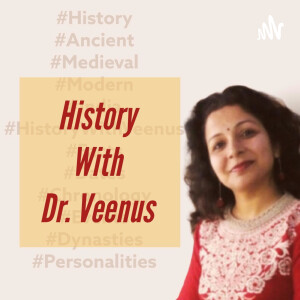
Indian History with Dr. Veenus
History

What is History?
The word History which originated from Greek word iotopia, historia, meaning "inquiry and knowledge acquired
by investigation" is the scientific study of the past. Events occurring before the invention of writing systems are
considered prehistory. "History" is an umbrella term that relates to past events as well as the memory, discovery,
collection, organization, presentation, and interpretation of information about these events.
Herodotus, a 5th-century BC Greek historian is often considered to be the "father of history" within the Western
tradition, although he has also been called the "father of lies". Along with his contemporary Thucydides, he
helped form the foundations for the modern study of human history.
What Is History? is a 1961 non-fiction book by historian Edward Hallett Carr on historiography. It discusses
history, facts, the bias of historians, science, morality, individuals and society, and moral judgements in history.
The book originated in a series of lectures given by Carr in 1961 at the University of Cambridge. The lectures
were intended as a broad introduction into the subject of the theory of history and their accessibility has
resulted in What is History? becoming one of the key texts in the field of historiography.
History is the study of life in society in the past, in all its aspect, in relation to present developments and future
hopes.
History is a significant record of events of the past, a meaningful story of mankind depicting the details of what
happened to man ,why it happened and how it happened. Mainly it deals with the human world.
The modern study of history is wide-ranging, and includes the study of specific regions.
view more
More Episodes
An Introduction to Vedangas- Dr. Veenus Jain
 2022-01-19
2022-01-19
 2022-01-19
2022-01-19
Upnishads - Vedanta - Dr Veenus Jain
 2022-01-19
2022-01-19
 2022-01-19
2022-01-19
Aranyak Grantha of Vedas- Dr Veenus Jain
 2022-01-19
2022-01-19
 2022-01-19
2022-01-19
Brahman Grantha of Vedas- Dr Veenus Jain
 2022-01-19
2022-01-19
 2022-01-19
2022-01-19
Chardham Yatra - Dr Veenus jain
 2021-12-17
2021-12-17
 2021-12-17
2021-12-17
Shaktism : An Introduction - Dr Veenus Jain
 2021-11-24
2021-11-24
 2021-11-24
2021-11-24
12 jyotirlingas in India - Dr Veenus Jain
 2021-11-23
2021-11-23
 2021-11-23
2021-11-23
Shaivism : An Introduction
 2021-11-18
2021-11-18
 2021-11-18
2021-11-18
012345678910111213141516171819
Create your
podcast in
minutes
- Full-featured podcast site
- Unlimited storage and bandwidth
- Comprehensive podcast stats
- Distribute to Apple Podcasts, Spotify, and more
- Make money with your podcast
It is Free
- Privacy Policy
- Cookie Policy
- Terms of Use
- Consent Preferences
- Copyright © 2015-2024 Podbean.com





